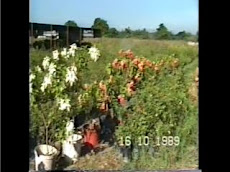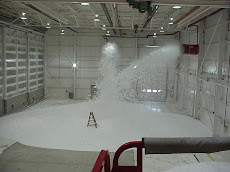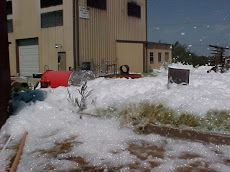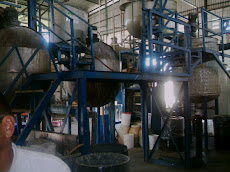Una gran cantidad de revistas tecnicas son publicadas periodicamente por Trade Publications y pueden ser obtenidas gratis. Para suscribirse, vaya a: http://www.tradepub.com/ y seleccione la que le interese. Llenar la solicitud es facil y al ser aprobado, recibira la publicacion por correo electronico e inclusive noticias semanales en los topicos seleccionados.S
FREE SUBSCRIPTIONS AT WWW.TRADEPUB.COM ALSO GET SANITARY MAINTENANCE AT WWW.TRADEPRESS.COM/SMSUB .
domingo, 27 de abril de 2008
OBTENGA REVISTAS TECNICAS GRATIS
sábado, 26 de abril de 2008
"GREEN" VS "NATURAL" CHEMICAL PRODUCTS
It has been known that there is a great difference in the market between "organic" and common vegetables; specially in price!! But what is really an organic or totally natural vegetable, and how is this related to chemical products??
Well by definition a totally natural material is one that has not been contaminated or transformed by any additive or process derived from human source. So if an apple is washed with soap, or washed with chlorinated water, or waxed, is then not natural and if it is collected and processed by a machine, then it is not natural by definition. So if a natural soap which is derived from coconut oils, oleic acid, glycerin and soda is reacted in a reactor and finally filtered, then would not be considered natural. I think that is not fare; since we should really qualify them as natural based on their biodegradability and their re utilization potential, in addition to the safety of use that they represent
Another great topic of concern is the use of "green bio-fuel".
It is known that everybody is now concerned with the environment and the reduction on the use of synthetic and hazardous materials, via the formulation of chemicals that will not harm the environment and are safer to use.
See constant issues and advances on this topics in http://www.icis.com/blogs/green-chemicals/ and in www.icis.com/blog for advances in chemical news. In the April 2008 issue of the publication HAPPI, see at: www.happi.com, we can see the advantages and disadvantages of the use of renewable resources as crops and other vegetables, as a substitute for hydrocarbons derived from the petrochemical industry; also the resolution of some big chains like Wall-Mart are requesting their supplier to provide green products.
The final concern is that even though the use of bio-fuels is practically a need due to lowering availability of oil with time, and its negative effect on the environment, also is very true that the use of crops will reduce its availability for human and animal nutrition and will also require more energy feed to transform them in alcohols or other fuel additives.There has also been concern on the volatile emissions of these bio-fuels into the environment, once they are used as fuel.
One thing seams to be true and this is that there will be no cost reduction on the use of crops as alternative fuel feeds. Methanol from garbage digestion seams to be a good alternative but is less viable due to the extent of conversion and efficiency.
Please feel free to write your comments.
miércoles, 23 de abril de 2008
Amonios Quaternarios Vs Compuestos Fenolicos como Desinfectantes
Los compuestos Cuaternarios tan pronto entran en contacto con las celulas de las bacterias, entran a travez de las paredes celulares por osmosis. Los Cuaternarios interrumpen el proceso metabolico, matando asi la celula bacteriana. En cambio los compuestos Fenolicos son mas extremos en su actuacion; entran en la celula bacteriana, lesionandola e hinchandola a tal extremo que la revientan. Los Quaternarios son residuales en superficies duras, pero los Fenolicos son aun mas; es sin embargo dificil determinar la longitud de la residualidad de ambos y eso dependera de las condiciones del ambiente. Los Fenolicos son agentes Anti-Tubercolosis por excelencia, aunque hay formulas con Quaternarios que tambien se usan para tal fin. Desfavorablemente, los Fenolicos son mas toxicos que los Quaternarios y son mas caros. Ademas los Quaternarios son solubles en agua y los Fenolicos no, haciendo que los Quaternarios sean mas utiles en formulaciones de limpiadores desinfectantes base agua.
Vistas de página en total
GREEN CHEMICALS
Also the materials have to meet with toxicity and health requirements regarding inhalation, dermal and eye contact. There is also a specific list of materials that are prohibited or restricted from formulations, like ozone-depleting compounds and alkylphenol ethoxylates amongst others. Please go to http://www.greenseal.com/ for complete information on their requirements.
For information on current issues regarding green chemicals, see the blog from the Journalist Doris De Guzman, in the ICIS at: http://www.icis.com/blogs/green-chemicals/.
Certification is an important — and confusing — aspect of green cleaning. Third-party certification is available for products that meet standards set by Green Seal, EcoLogo, Energy Star, the Carpet & Rug Institute and others.
Manufacturers can also hire independent labs to determine whether a product is environmentally preferable and then place the manufacturer’s own eco-logo on the product; this is called self-certification. Finally, some manufacturers label a product with words like “sustainable,” “green,” or “earth friendly” without any third-party verification.
“The fact that there is not a single authoritative standard to go by adds to the confusion,” says Steven L. Mack M.Ed., director of buildings and grounds service for Ohio University, Athens, Ohio.
In www.happi.com of June 2008 edition, there is a report of Natural formulating markets that also emphasises the fact that registration of "green formulas" is very confused at present, due to lack of direction and unification of criteria and that some governmental instittion (in my opinion the EPA) should take part in this very important issue.
















































